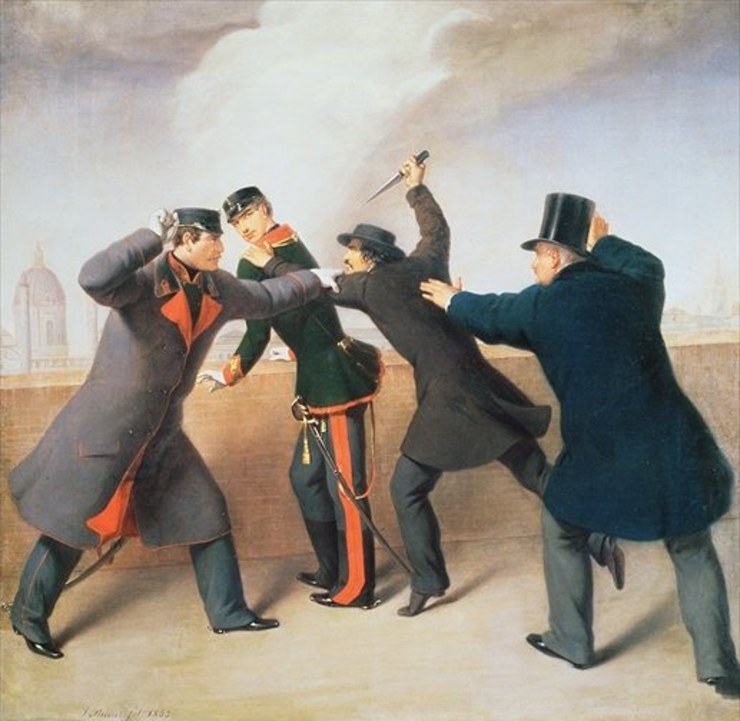Za cca 14 dní trest smrti to je mazec 
Viky, díky moc za všechna ta čteníčka 
15 February 1853 Unsuccessful assassination of Franz Joseph I.
Categories: Personalities , Years of war and revolution , Calendar

János Libényi, a tailor's journeyman and nationalist, was sentenced to death for the unsuccessful assassination of Franz Joseph I. He attacked the future Austrian emperor while walking on the walls of Vienna. It happened on 15 February (also reported as 18 February) 1853.
Throughout Franz Joseph's reign (1848-1916), the question of who would succeed him was still being debated. Concerns grew at a time when only with great luck did he survive the assassination. It all happened one day in February 1853 at noon, when the young monarch, accompanied by Count Max O'Donnell, was walking along the walls of Vienna and watching the soldiers drill. At an unguarded moment, the twenty-one-year-old Libényi rushed at him from behind and stabbed Franz Joseph in the neck with a long kitchen knife.
"Josef Ettenreich, the master butcher, restrained him and disarmed his assailant, whose cry of "Eljén Kossuth!" revealed his sympathy for the Hungarian struggle for independence in 1849/49. Only later did the romantic idea spread that the young secessionist was avenging the dishonour of his sister Margit, a dancer withMizzi Langrova," Miroslav Martínek writes in his book The Bloody Road to Sarajevo.
According to an old legend, the emperor said after the attack, "Calm down, it's nothing! I only share the fate of my soldiers in Milan." February 1853, when in the capital of Lombardy, which at that time remained part of the Austrian Empire. However, this was not to the liking of the freedom fighters of Italy, who raided the guardhouse, killing twelve and wounding over seventeen imperial soldiers.
The Emperor was taken to the palace
The Viennese present wanted to literally tear the assassin apart, but Franz Joseph wanted them to do no harm and just have him arrested. "The wounded emperor was taken to the nearby Archduke Albrecht's palace, where the Albertina exhibition hall is today. The court physician, Professor Seeburger, was summoned there. Here the monarch was also met by his brother Karel Ludvík, three years his junior," Martínek describes in his book.
In a letter to his other brother Ferdinand Maximilian, Karel Ludvík described the meeting with Franz Joseph in this way: "I see the Emperor standing in the anteroom, admirably calm, with his wound fortunately bandaged. Our great brother spoke in his typical style that it was nothing and looked as usual, although he had lost a lot of blood. And he told me to run to my mother and tell her it was nothing, so she wouldn't get scared and run after him. “
Meanwhile, police officers took charge of the bomber. They said he was constantly lying and making up untruths. During the interrogation, the police looked for his connections abroad, namely to Hungarian emigrants living in Paris and London. The chaplain from Mladá Vozica, Jan Baptist Sika, was quite clear, and in his verses he described the conspirators seeking His Majesty's life as devils in the flesh. Several days of imprisonment broke the attacker, streams of tears flowed down his face. He admitted that his motive was political, as a Hungarian patriot seeking revenge for the lost revolution. But he did not reveal who helped him. The military court sentenced him to death, which was carried out on the morning of 26 February 1853.
Miroslav Martínek: The Bloody Road to Sarajevo,
www.biographien.ac.at, www.alternatehistory.com
The article is included in categories:
- Archive of articles > Personalities
- Archive of articles > Years of war and revolution
- Archive of articles > Calendar
Post
To jsem ráda, že se články líbí  24. února 1853 byl rozsudek potvrzený, poprava byla 26. února. Omlouvám se za chybku
24. února 1853 byl rozsudek potvrzený, poprava byla 26. února. Omlouvám se za chybku 
Díky za článek. Zajímavé čtení. 

Také děkuji ,zajímavé počtení , zase jsem se něco nového dozvěděl 











